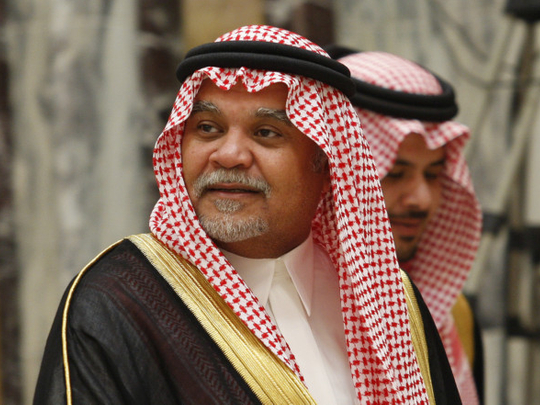
Riyadh
The appointment of Saudi Arabia’s longtime envoy to the United States as intelligence chief marks an attempt to give the service a diplomatic edge at a time of turmoil in the region, analysts say.
Prince Bandar Bin Sultan, who served in Washington from 1983 to 2005 and was named intelligence chief on Thursday, has the ability “to think outside the box, overcome obstacles, make decisions and work in an innovative way”, international relations analyst Abdullah Al Shummari told AFP.
He could play a key role in helping the kingdom “re-evaluate its strategies in foreign policy... [as] major geostrategic changes across the Arab world will rearrange the roles of Saudi Arabia, Turkey and Iran in the Middle East,” Al Shummari said.
Saudi Arabia has “an opportunity to regain its leading role” in the region after it “subsided in favour of Iran and Turkey following the September 11, 2001 attacks and the US invasion of Iraq” in 2003, he said.
Abdul Aziz Sager, chairman of the Gulf Research Centre, believes that “the current situation requires greater coordination, not only on a regional level but also internationally”.
The kingdom, which had traditionally focused on maintaining strong ties with Western powers, had in recent years tried to “establish good relations with Russia and exchanged visits on the highest levels”, said Sager.
But relations with Moscow have taken a series of hits since the Arab Spring uprisings swept the region last year, notably over Russia’s support for its longtime ally Syrian President Bashar Al Assad.
While Saudi Arabia has openly called for the arming of rebels fighting Al Assad’s regime, Russia has joined China in repeatedly using its veto to block tough action at the UN Security Council over the 16-month revolt.
The situation “requires someone accustomed to the game of interests” of international powers, Sager said, noting that Prince Bandar had achieved “several” major successes on the world stage over the years.
For instance he managed to convince Russia not to oppose UN resolutions to expel now executed Iraqi dictator Saddam Hussain’s troops from Kuwait following his invasion of the emirate in 1990.
He “is among the people who best understood US policies and managed to deal well with the decision-makers,” said Anwar Eshki, president of the Saudi-based Middle East Centre for Strategic and Legal Studies.
He “will be able to achieve better understanding between Americans and Arabs” as the Middle East faces persistent upheaval from the Arab Spring uprisings that erupted at the end of 2010, said Eshki, who worked with Bandar in Washington.












